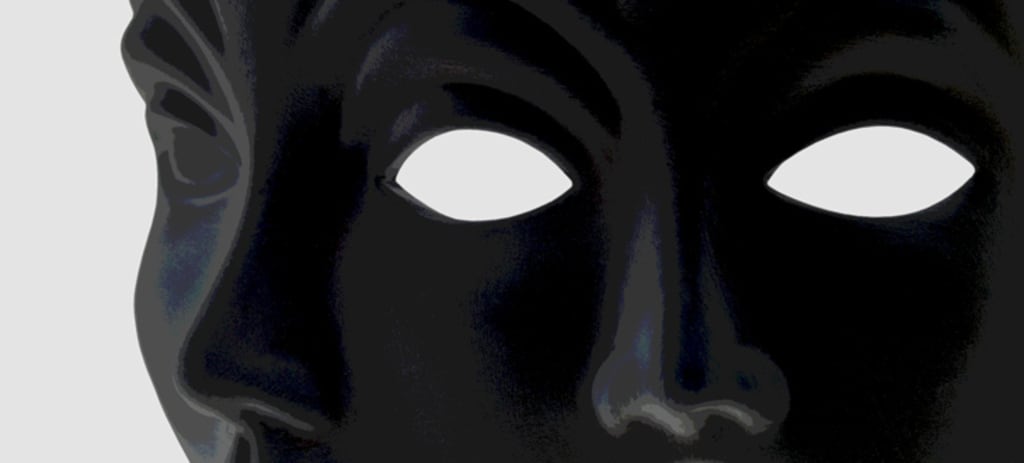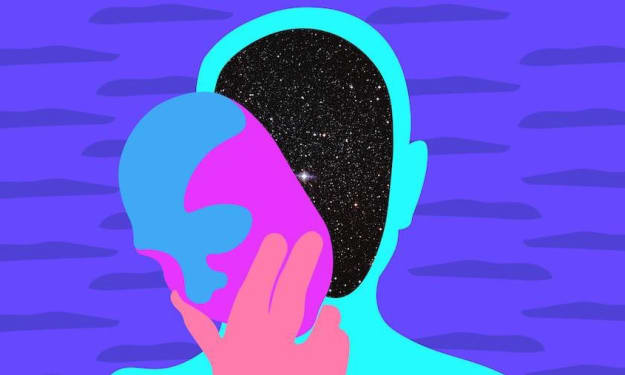
To begin this conflict analysis, it would be most suitable to discuss the beginning of the conflict, which was August 11, 1997. Coincidentally enough, it’s also the date of my birth. Though it may seem strange, my conflict analysis won’t be between myself and another person, so to speak, but between myself and myself. While I don’t remember much from this date up until a few years ago, except for a few glimpses and flashes of memories, it’s safe to say that the origin of my internal conflict has been with me since birth. This mysterious origin is a hereditary mental illness, passed down to me by my father, which makes me feel like two or more different people in constant conflict—bipolar disorder.
Early On
I can recall experiencing symptoms of bipolar disorder as far back as my mid-teens, right around the time that I was in the midst of an abusive relationship—sexual, physical, mental and verbal—which ultimately resulted in me being pregnant and single. Marcia Purse, in her article “Understanding the causes of bipolar disorder,” discusses the several proposed risk factors and triggers of bipolar disorder. While it’s not assuredly defined and there’s still research being conducted regarding this matter, there are studies which have led researchers to believe that, "... stressful life events can lead to the onset of symptoms in bipolar disorder. However, once the disorder is triggered and progresses, "it seems to develop a life of its own." Once the cycle begins, psychological and/or biological processes take over and keep the illness active” (Purse, 2019). I believe that this relationship and the drastic change in my life—being a single mother, while simultaneously a freshman in high school—is what cued the onset of my symptoms, thus marking the beginning of my conflict.
Manic and Depressive Episodes
While in a manic episode, I’m usually irritable, I have feelings of euphoria, and I’m more likely to have a heightened mood and to be more energetic and active. However, I’m also more likely to make poor decisions, such as purchasing things I can’t afford, crossing a line in a relationship I shouldn’t, or hurting someone I care about. Consequently, in a balanced state, I kick myself metaphorically, or in a depressed state, self harm, to punish myself for what I’ve done. When in a depressed episode, I’m prone to lying in bed or on the couch for hours, cancelling appointments and activities, pushing people away, fixating on negative thoughts, and in extreme cases, self harming or having thoughts, plans, or attempts of suicide. In a balanced state, I wonder why I would do or think such things when it hurts me and the people around me. Fortunately I’ve moved past what I believe is the worst of my episodes and I’m on the road to recovery, but I still have internal conflict about decisions I’ve made and things I’ve done. It haunts me to think that I am capable of such things in an altered state of mind, and I still have conflicting thoughts when I get urges to do things I’ve done in the past. I find myself arguing with myself and going back and forth about a given topic which I can’t come to a conclusive decision on how I feel about it. I believe that this conflict is derived from conflicting perspectives and thoughts from either end of the spectrum as well as from my balanced state mixing at one time and creating a hurricane of thoughts in my head.
The Two Parties: Balanced and Unbalanced

photo credit: The Delta Statement
I would like to clearly define the two conflicting parties now that I’ve explained what all parties consist of. The first, which I am writing in the perspective of, is myself in a balanced state. I’m diagnosed and aware of my symptoms, as well as medicated. The second is myself in any state which is not balanced, usually in a manic or depressive episode. Imagine a small circle drawn in the center of a larger circle. Anything within the smaller circle is balanced for the most part. The further away that I draw from the circle of stability towards the outside of the larger circle, whether up or down, the more out of balance I am—either manic or depressive, respectively. Myself in the smaller circle of stability is who is in conflict with myself outside of that circle.
My Journey
At the beginning of this conflict I was unaware of my disorder, the significance or presence of my symptoms, or the need for treatment. After having several episodes over the course of four years, I ended up seeing a range of specialists and having a brief stay at a mental hospital by voluntary submission—I needed help and I knew it. I couldn’t stand being in this constant conflict within my own head. After that I was finally diagnosed and I began the process of finding the right medications to balance my mind, as well as seeking therapy. Unfortunately it took and is still taking longer than expected to find the right balance of medication, but I am infinitely better now than a few years ago when it all started... I am more at one with myself because the extremes of my mind are quieted, preventing most of the conflict from ever happening. My goal is to find balance in life, mentally, emotionally, and physically, and then to not need as much medication to keep me stable.
In a balanced state, I feel that I have significantly less power than myself in a manic or depressive state. Those episodes completely overpower me and change the way I think, act, and feel. The only way I am able to control them is through medication, which defeats me in its own sense. I feel that I’m unable to be myself for who I am, my real self, because it’s too destructive for me and the people around me. I have to be sedated by medication in order to live relatively peacefully in my own head and around other people. I often feel threatened by my own mind and its capabilities, and I feel that it has more control over me than I realize, that it tries to sabotage me and hurt me against my own will. An example of this is a manic symptom where I will suggest to myself that I don’t need my medication, that I’m balanced and fine, and I don’t need to be sedated by medication to live peacefully and happily. I’ll feel as if my medicine is hurting me and I’ll have strong urges not to take it. However, my doctors and therapists warn that these thoughts will occur and I have to fight them, or else I’ll go into more severe manic or depressive episodes, resulting in effects of greater severity. Consequently, I’ll develop feelings of paranoia that my doctors and therapists are wanting me to be sedated, and will encourage the intake of the medicine because my brain is too powerful to be handled by myself and other people. This is a textbook example of a manic episode with symptoms of euphoria.
The Role of Others in my Conflict

photo credit: Thrive Family Support
Others have definitely become involved in my conflict—my family as well as different relationship partners. My family has always been as supportive as they could, but past relationship partners have just been unable to understand me and the way I conflict with myself, and have consequently made it worse. Fortunately though, the person I am in a relationship with now is much more understanding, patient, and willing to learn about who I am and how my mind works. I believe that for the most part, this conflict has been destructive. I have been through much worse experiences because of it as opposed to constructive or positive experiences. I do feel I have experienced heightened and deeper feelings and thoughts that most people don’t get to experience, and I’ve learned from mistakes I’ve made which has made me into a stronger and more independent person, but the negative effects greatly outweigh any gain in my opinion.
My conflict carries into all parts of my life, whether it’s anxiety at work, with school, in my relationship, my status as a parent, and relationships with other people who aren’t my significant other. My mother is the person most often drawn into my conflict because I’m closest to her and I trust her unshakingly. My siblings, father, and a couple friends have also seen me in my states of imbalance and have been affected by that as well.
Finding Solutions
Often I will try to come up with solutions to better balance myself and to find ways to control the powerful thoughts and feelings that bipolar disorder enables. Examples of these solutions are self care, meditation, conducting research to find what works for other people, and medication. Most of the time I follow through with them but I do still experience conflict internally to date—so I’ll still be working on finding better solutions.
I have changed so much since my conflict began, in fact I’m still changing—I feel like I’m in a constant state of change and development. I’m less sure of my place in this world, but more aware of the expanses of my mind and its capabilities. I’ve been broken and put back together mentally and emotionally several times, whether by my own hand or that of someone else, and my shape has changed every time—I reemerge from the chaos of my conflict as a different person with more strength and a better understanding of myself and the world around me.
Expression of emotions is sometimes difficult for me—I often utilize avoidance in relationships with other people and I’m prone to stonewalling when I get emotionally overwhelmed. However, in the past I have expressed emotions with abusive tendencies towards others and myself. For others it was often verbal abuse, which I would then turn around and feel terrible for what I said moments later, but the damage was already done. For myself it’s mental abuse and sometimes physical—namely substance abuse or self harm, but I’m almost four months clean from self harm and substance abuse, so that is improving. I’m also working to improve the way I interact with others and I believe that is coming along as well. I attempt to control and alleviate the the conflict by staying in a balanced state as much as I can, usually through the intake of mood-stabilizing medication. A third party has been helpful, whether it’s my mother, significant other, doctor or therapist, who help to ground me in the midst of my experiencing identity issues because of this conflict, and I have for a while, before I even knew I had bipolar disorder. I could better manage my conflict if I could better communicate my thoughts, feelings and concerns to the people around me that care about me.
About the Creator
Vans Life
Just your average (not at all) college student trying to get it right. Feel free to send suggestions, comments or questions directly to me at: [email protected]






Comments
There are no comments for this story
Be the first to respond and start the conversation.